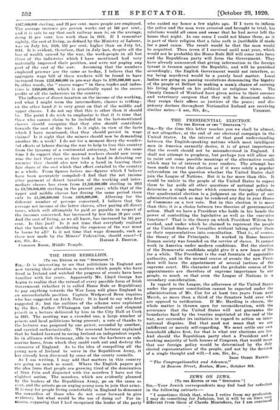THE PRESIDENTIAL ELECTION. [To THE EDITOR. or TEL "SPECTATOR."]
Sts,—By the time this letter reaches you we shall be almost, if not altogether, at the end of our electoral campaign in the United States. In the interest of that good understanding between the English-speaking nations which most intelligent men in America earnestly desire, it is of great importance that the result should not be misunderstood in England. I shall not attempt to prophesy, but perhaps you will allow me to point out some possible meanings of the alternative result which may be of interest to your readers. The attempt has been made to treat the election as if it were solely a popular referendum on the question whether the United States shall join the League of Nations. But it is far more than this.' It would be unfair to the people of the United States to expect them to lay aside all other questions of national policy to determine a single matter which concerns foreign relations. Our quadrennial election is a judgment on the -policy of our administration such as may be rendered any day in your House of Commons on a test vote. 'But in this election it is more than this; it is a choice between two theories of governmental action. Shall we have a President who holds in his hands the power of controlling the legislative as well as the execntive functions? That is the theory on which President Wilson has worked, and under which lie claimed to represent the people of the United States at Versailles without taking either them or their representatives into consultation. That is, of course, the theory of the Principate. It worked in Rome because Roman society was founded on the service of slaves. It cannot work in America under modern conditions. But the election of the Democratic candidate might give it a new lease of life for a while. The President is the real fountain of appointive authority, and in the normal course of events the new Presi- dent will have the appointment of several justices of the supreme court. His character and the probable course of his appointments are therefore of supreme importance to our people, so much so that even the League of Nations is •a secondary consideration.
In regard to the League, the adherence of the United States
under the present constitution cannot be expected under the administration of Mr. Cox for at least two years from next March, as more than a third of the Senators hold over who are opposed to ratification. If Mr. Harding is chosen, the whole matter is thrown open for reconsideration, with the assurance that the United States will not guarantee the boundaries fixed by the treaties negotiated at the end of 'the war, nor surrender its initiative in regard to action on inter- national disputes. But that need not mean that we are indifferent or merely self-regarding. We must settle our own household affairs first, for that is what our elections are for. And should the Republican party elect a President and a working majority of both houses of Congress, that would mean that our foreign policy would be determined by the duly elected representatives of the people, and not by the decision of a single thought and will.—I am, Sir, Ac.,
ISAAC Opus ROMs.
The Congregationalist and Advance,"
14 Beacon Street, Boston, Mass., October 9th.


































 Previous page
Previous page